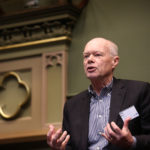The Four C’s
When international aid deploys innappropriate technology, there can be unwanted, or even disastrous consequences.
No, this is not a guide to buying an engagement ring.
When I read this article recounting the story of a premature baby dying in a bed amidst a ward crowded with empty incubators, I was appalled but couldn’t share in the journalist’s dismay. Sadly, I recognised it as yet another example of inappropriate technology being deployed to useless or even damaging effect.
Maybe the user manuals weren’t provided, or they were written in a language nobody at the hospital understood. Maybe the specialist heat generating light bulbs had all blown and couldn’t be replaced?
At Engineers Without Borders (EWB) we talk about the Four C’s to Development; consciousness, concern, comprehension and challenge.
Consciousness is the catalyst for change. If there is no awareness of a problem then there can be no movement to fix it.
Australians are exposed to more information than ever before and we have a strong awareness of the inequalities between developed and developing communities. The next step is making sure we actually care. Increased consciousness will come to nothing unless we convert it into concern.
Comprehension is the crucial step that is often missed, with people jumping straight past it to the fourth C, challenge.
The challenge is all about how we respond to that feeling of wanting to "do something". A typical gut reaction is to help by giving. It’s a wonderful sentiment, but sometimes it is more destructive than constructive because if you haven’t fully comprehended the complexity of the problem before responding to the challenge there can be unintended consequences.
At one Sri Lankan hospital after the 2005 Tsunami there was a glut of surgeon’s caps. Thousands of the things had been donated by a foreign hospital that had an excess supply. Not only is this type of aid ridiculous, it’s damaging. Those unwanted caps used up precious transport and storage resources. Meanwhile the hospital was deprived of basic supplies, such as sterile bandages, of which they were in dire need.
One of the most commonly misunderstood forms of international charity is food aid. If not properly managed food aid can flood a small market in a flash. Before long the media focus shifts and the donations dry up, by which time the local merchant may be out of business and the long term reliability of food supply is irreparably damaged.
Engineers tend to be practical people by nature, so when new members join us they are often rearing to go. If a request for a water well comes in we want to avoid the first response to be to build it. What if there’s arsenic in the ground water? Is a well still appropriate? Maybe rain water storage is a better idea?
How thoroughly and comprehensively a complex issue has been understood will be reflected in the appropriateness of the ensuing response. It’s a never ending process. The more you comprehend the more conscious you become of what you don’t know. We endeavour to build a culture of understanding the complexities of a situation deeply before intervening. There will always be unintended consequences, but hopefully less of the bad ones.
That’s why we always approach problems from a grassroots perspective to work in cooperation with local people and try to support local institutions. When agencies come up with solutions without first speaking to the people directly affected it never ends well.
An essential step in comprehending development is understanding communities and their people. Cultural norms, expectations, corruption, ego, strengths, fears, leadership and even gender equality play a big part in determining what is and is not appropriate. All good development is based on meaningful relationships with the people involved.
By creating partnerships with schools, orphanages, women’s groups and other local organisations making a positive difference in their communities we gain an invaluable insight to of the issues facing them. Listening, learning and sharing provides the best chance for success.
Daniel Almagor is the founder and CEO of Engineers Without Borders Australia (EWB) and the Managing Director of Medivax Pty Ltd. He also sits on the Board of the Jewish Museum of Australia. Daniel holds two degrees: a Bachelor of Aerospace Engineering and a Bachelor of Business Administration, both from the Royal Melbourne Institute of Technology (RMIT). In 2003, Daniel won the Churchill Fellowship to further the growth of EWB in Australia. Daniel has been named in the 100 most influential engineers in Australia in 2005 and he was recognised in a list of the most inspiring young engineers as well as in the RMIT Acclaimed Alumni. www.ewb.org.au













MikeM
March 13, 2009 at 12:38 pm
Spot on, Danny
The first step is to analyse the problem and define the requirement. The international aid community is an even worse culprit than the Western technology culture's practice of selling what they have rather than what the customer wants (Business Solution? click here). It becomes egregiously awful when the stuff is being given away, as there is no market signal to stop deluging people with useless rubbish.
MikeM trained as a systems analyst.